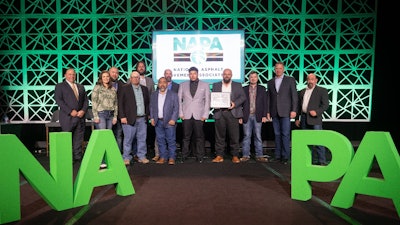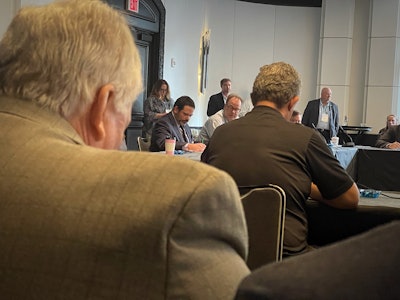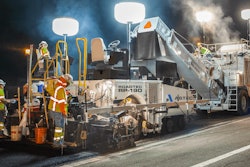
Last month the National Asphalt Pavement Association held its annual meeting at the Loew's Hotel in Miami, Fla. It was this editor's first time at an official NAPA function, getting to meet so many leaders in our great industry. There were experts and veterans from every corner of the asphalt world: Producers, contractors, scientists, researchers, federal government leaders, manufacturers, and stakeholders of every other kind.
Over the course of the five day meeting, we were able to attend all the general sessions, as well as many of the smaller educational sessions, and some of the open committee meetings too. Besides what things may have been discussed in the few closed-door sessions, there were three major takeaways that had a ubiquitous level of representation throughout the conference.
1.) Sustainability
During the session "The Asphalt Plant of the Future" the representative from Astec Industries made a joke that drew lots of laughter and agreement from the large ballroom audience. He said that he was going to do everything in his power not to use the word "EPD". The reason it resulted in laughs, was because every single person in that auditorium, who'd been sitting through lectures the last several days, all knew the same thing. No matter what kind of sessions you'd been attending, EPDs were being talked about. 
In fact, in this very issue, we interviewed the head of sustainability from NAPA, Joseph Shacat, about this very topic. He is promoting an important education session he will be conducting at CONEXPO, and there is good reason for all of this. The new chairman for NAPA, Christian Zimmerman even proclaimed in his opening address to the conference that, "the word of the decade is 'sustainability'."
This is because a sea of change is taking place behind the inner workings of the industry at the Federal level. Speaking with veterans of the industry, the types of people who have worked through multiple political eras and numerous administrations and their initiatives, the sentiment seems to be fairly uniform. "This isn't going away," said John Hickey, the executive director of the Asphalt Pavement Association of Oregon.
Having attended every available session about sustainability, the good news is that the leaders of the industry are working hard on behalf of everyone on a near constant basis. Hand-in-hand with the legislation laid out in the Inflation Reduction Act and representatives from the EPA and FHWA, these changes are coming, and, in fact, are already here. You're going to hear more and more about EPDs, GWPS, "buy clean" plans, and other things currently in the works. However, there's still a lot you can do.
2.) Get Involved
The second takeaway from the 2023 NAPA Annual had to be how much the speakers and educators reinforced the importance of getting involved locally and on the State level in regards to how policies are being developed and implemented. Several shared first-hand anecdotes about the benefits of getting directly into the process, because, right now, the biggest thing is that there often aren't the kinds of people "in the room" with experiential knowledge of our industry, when hugely impactful decisions are getting made.
The primary way to influence the subtle nuance of how these policies will be implemented is to call your representatives in your State, make the right contacts in their offices, find out when their committees and meetings are being held, be helpful, and be a resource to them, because ultimately when the "benchmarks" are set for new emissions and efficiency standards you want to have a seat at the table. That is preferable to sitting things out, and just accepting whatever the states hand down, and then reacting to it afterwards. It is a lot harder to undo what is decided, than to help guide the decision process itself.
3.) Data, Data, Data
This brings us full-circle. During the third general session, a Federal panel about the impacts of recent legislative and policy efforts on the industry, Danny Macri, Industrial Sector Manager, Climate Protection Partnership Division (EPA), spoke in detail about the need for an increased partnership between the governments and the private sector. Of course, the panel in general discussed EPDs and how they are, at their core, a tool for communication. They contain important Life Cycle Analysis (LCA) data that will influence the green procurement funding and policy centered on lowering GHG emissions and securing materials with lower embodied carbon.
While there exists no current Federal mandate to share this information, there will eventually be one in all but name. It was made quite clear that to participate in future job bids for government jobs, as well as for major high level private sector ones too, EPDs will be required. That aside, what Macri and the rest of the panel stressed was really boiled down quite well in his quote, "In order to have good policy, you need good data."
Rules are going to be set in place, but the more varied data the government gets, the better for everyone. Why? Because if the vast majority of EPDs submitted come from only certain parts of the country, then the policy will reflect the data collected only from those states. The models can't account for data not received. This could have serious repercussions when talking about asphalt plant emissions of all scopes, as they differ from states like California and West Virginia. It can't be overstated how important this phase of information gathering is on the future.
There is of course, one white elephant in the room, that came up at least once during the Sustainability Committee meeting. One contractor from Colorado (a state already collecting EPDs) explained that there is some concern about the data they are sharing, and despite the importance of EPDs, this concern is extremely valid from the private sector perspective.
As everyone knows, there is no greater "trade secret" than a company's mix-designs. That's the secret sauce that truly differentiates one producer from the next. In the state of Colorado, CDOT wants to get the contents data down to within .1% accuracy, as well as getting more detailed information about their sourcing. Producers were already concerned with the prior expectation of "whole percent" accuracy. These mix-designs are highly confidential, of course, ever more refined and specific. Giving the mix figures with such specificity, and their sourcing, obviously has some deep implications. As the chair of that committee said in closing, "That is a problem we wont readily be able to solve here today, but we will."




















